|
Ali
|
Welcome back to Shots Mark! And love the shoes.
|
|
Mark
|
Thanks, Ali. I’m wearing a fine pair of brown suede Campers at the moment. I know you’re a man who appreciates finely crafted footwear…
|
|
Ali
|
Yes indeed… First of all - tell us how you plan following up the dramatic climax in Lazybones as poor old Thorne was rather traumatized?
|
|
Mark
|
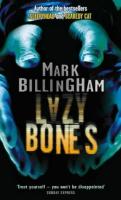 Well, it’s difficult to go into too much detail without spoiling both the ending of Lazybones and the next book for readers, but I believe that your characters have to be affected by what happens to them book to book. They can’t just appear in the next one, emotionally unscathed, like cartoon characters. They carry stuff around with them and it affects their behaviour and if you want to construct stories around believable characters then you have to do that. Anything else is fake. It’s a Boys Own yarn and nothing more. I want Tom Thorne to grow as a character and that means that what he does is affected by what he has done. There are scars that you can see and scars that you can’t. That’s very much where the notion of The Burning Girl came from. Well, it’s difficult to go into too much detail without spoiling both the ending of Lazybones and the next book for readers, but I believe that your characters have to be affected by what happens to them book to book. They can’t just appear in the next one, emotionally unscathed, like cartoon characters. They carry stuff around with them and it affects their behaviour and if you want to construct stories around believable characters then you have to do that. Anything else is fake. It’s a Boys Own yarn and nothing more. I want Tom Thorne to grow as a character and that means that what he does is affected by what he has done. There are scars that you can see and scars that you can’t. That’s very much where the notion of The Burning Girl came from.
|
|
Ali
|
So please tell us more about The Burning Girl. Where did the initial idea originate?
|
|
Mark
|
In plot terms, it came from something that happened to a friend of mine when she was at school. The opening of the book is a heightened version of that incident. A very bizarre incident in a playground. As she was telling me the story, one part of my brain was reacting, appalled, while another was thinking “what if…?” I wanted The Burning Girl to be a very different book from its predecessors. There’s a lot of the usual stuff - memory and family, and the way the past intrudes on the lives of those still living. But there isn’t a serial killer to be seen. I wanted to look at the world of those who kill for financial reward, as well as taking Thorne to places - in every sense - that he has not been before.
|
|
Ali
|
So why are you attracted to these dark tales? Especially as you are so affable by nature, in fact a stand-up comic?
|
|
Mark
|
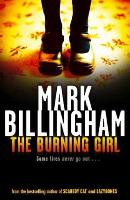 I’m delighted of course that you think I’m affable, but it’s by no means a rule of thumb with comedians! There’s a popular conception of course that comics are all very dark, very screwed up people. That we all need attention. That’s true, of course, but to be serious I think that when I began to read crime fiction, I was attracted by stuff that was a million miles away from what at that time was the day job (though I worked at night). Cheap gags for a living, dark tales of violence and redemption to relax. I’m attracted by writing that reflects the world we live in and while I STILL hold a lot of store by humour and fortitude, few could deny that it’s a pretty dark place of late. There’s a great maxim that was coined by Antonio Gramsci : “pessimism of the intellect, optimism of the will.” I’m delighted of course that you think I’m affable, but it’s by no means a rule of thumb with comedians! There’s a popular conception of course that comics are all very dark, very screwed up people. That we all need attention. That’s true, of course, but to be serious I think that when I began to read crime fiction, I was attracted by stuff that was a million miles away from what at that time was the day job (though I worked at night). Cheap gags for a living, dark tales of violence and redemption to relax. I’m attracted by writing that reflects the world we live in and while I STILL hold a lot of store by humour and fortitude, few could deny that it’s a pretty dark place of late. There’s a great maxim that was coined by Antonio Gramsci : “pessimism of the intellect, optimism of the will.”
|
|
Ali
|
Do you still find writing about Thorne and his team as challenging as it was back when you nailed Scaredy Cat?
|
|
Mark
|
Yes, more so. You’d think that once you’ve done it a few times you’d find it easier, but it’s a simple fact that writing gets harder book by book. At least it has for me. It’s taken me a while to realise that this is the way it should be. As a writer you want each book to be better than the one before; it can’t be of course, not always, but that’s your ambition. However it turns out, you start with the very best intentions. On top of this of course there are always certain commercial pressures - everyone wants the next book to be better reviewed, to get higher on the list or whatever - but at bottom, you want the writing to be better. You want to engage the reader, to write better prose, to tell a better story. I think I’d be worried now if writing a book suddenly became a doddle. And the fact that Thorne (hopefully) is still evolving as a character makes it a challenge each time he blunders into a new narrative.
|
|
Ali
|
So when is The Burning Girl out?
|
|
Mark
|
It’s out here in the UK on July 19<SUPTH< sup> and I suppose it will be out in the US around a year later. Though my US publisher, William Morrow, are trying to catch up I think, so it could be a little sooner than that.
|
|
Ali
|
Do you feel any pressure from your publishers in your direction of Tom Thorne and his team?
|
|
Mark
|
No, none whatsoever. I never submit pages ahead of time, or any sort of synopsis. They’ve shown incredible faith in being happy to take each book as it comes. I mean, obviously if I turned in a book in which Tom changed direction and the manuscript consisted of an epic poem interspersed with recipes and the mystery got solved by Elvis the cat, they’d probably raise an eyebrow.
|
|
Ali
|
I thought that Lazybones was your darkest work with its theme of homosexual rape. Were you concerned at the subject material?
|
|
Mark
|
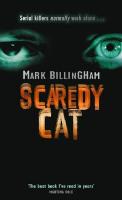 In the previous book, Scaredy Cat, I’d been considering how a police officer might function when he didn’t feel the things about a murderer he thought he was supposed to. In Lazybones, one of the things I wanted to do was to ask how he might function if his feelings about the victim were skewed. In this case, the murder victims are convicted sex offenders and that throws up a lot of interesting questions. None of them easy and none of which the book necessarily answers, but I wanted them to be there, hovering around. It was also around the time of the naming and shaming stuff that was happening here in the wake of a very gruesome child killing. Ugly scenes - mobs burning pediatricians’ houses down and it seemed like the world had gone mad. So I wanted to look at vigilantism as well and what our responsibilities are as citizens if we believe, in principle at least, in a system of justice. Yes, the subject matter was very dark and often disturbing, but thankfully the response was a positive one. Most people thought the subject matter was handled sensitively. I think that, of the three that had been published to that point, Lazybones was the book I was proudest of. In the previous book, Scaredy Cat, I’d been considering how a police officer might function when he didn’t feel the things about a murderer he thought he was supposed to. In Lazybones, one of the things I wanted to do was to ask how he might function if his feelings about the victim were skewed. In this case, the murder victims are convicted sex offenders and that throws up a lot of interesting questions. None of them easy and none of which the book necessarily answers, but I wanted them to be there, hovering around. It was also around the time of the naming and shaming stuff that was happening here in the wake of a very gruesome child killing. Ugly scenes - mobs burning pediatricians’ houses down and it seemed like the world had gone mad. So I wanted to look at vigilantism as well and what our responsibilities are as citizens if we believe, in principle at least, in a system of justice. Yes, the subject matter was very dark and often disturbing, but thankfully the response was a positive one. Most people thought the subject matter was handled sensitively. I think that, of the three that had been published to that point, Lazybones was the book I was proudest of.
|
|
Ali
|
Music is important to you as well as featuring heavily in your Tom Thorne series. Any plans to release a CD like Mike Connelly and George Pelecanos? And if you were to, what sort of tracks would you have? And would they all be C & W?
|
|
Mark
|
No plans, but they would be country songs in the main. I love a wide range of country stuff and I’m trying to broaden Tom’s horizons a little. There would be plenty of Cash and Hank Williams of course. There’d be cheesy stuff - mid-period George Jones - as well as some edgier stuff that you’d probably call alt country or Americana or whatever. Then I’d have to throw in some Costello, just because I could.
|
|
Ali
|
I heard you introduced George Pelecanos on his London reading in Clapham, so could you tell us why you find his work important?
|
|
Mark
|
Obviously I think George is a tremendous writer, but he’s a friend first and foremost so it was a pleasure to introduce him. He did the same for me in Washington last year and it was an honour to return the favour. It was a great gig as well - shedloads of people turned out to see him which was brilliant. There are very few really original voices in this or any other genre and George’s is one. He’s also a man of course who knows all there is to know about fine shoes.
|
|
Ali
|
Yes, indeed, a genuine Shoedog! Anyway, this year we’ve had two short stories from you in both the excellent Men From Boys (ed. John Harvey) as well as Karin Slaughter’s Like A Charm. Can you tell us how you became involved in these collections and are you planning anymore?
|
|
Mark
|
Well, I got involved simply because I was asked. In each case, it was very easy to say yes once I’d looked at some of the company I’d be keeping. These were the first short stories I’d written and I was keen to have a go. It was tremendous fun and also very useful, I think. It taught me about economy, about not wasting words. You can afford to be a little self-indulgent over 100,000 words but every one of the buggers counts in a short story. It’s a great exercise in being brutal. Yes I’d love to write some more. Karin’s already asked me to write one for the follow-up to Like A Charm, but she may have been drunk at the time.
|
|
Ali
|
We saw you around in Las Vegas for Bouchercon. Can you tell us what you got up to on that trip?
|
|
Mark
|
I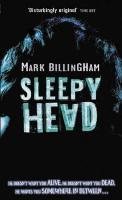 can’t honestly say that I enjoyed Las Vegas as much as I’d hoped. I was REALLY looking forward to that trip but it didn’t go terribly smoothly. I don’t think anyone who was there would argue when I say that the hotel was less than wonderful. It’s hard to relax when there’s a sign in the room telling you where to dispose of your syringes. That said, it was great to catch up with so many friends - which is, I think, the best reason for going to a Bouchercon. John Connolly and I went on a helicopter ride across the grand canyon which would have been better had not a woman in my signing line not told me an hour before we were due to fly that one had crashed the week before, killing eight people. There was a good deal of clenching going on during that flight. We landed on a ranch and chucked lassos and ate beans and stuff, and I got to see Connolly on a horse which was worth the price of the trip all on its own. There was also some mud wrestling on another night but I shan’t go into that… can’t honestly say that I enjoyed Las Vegas as much as I’d hoped. I was REALLY looking forward to that trip but it didn’t go terribly smoothly. I don’t think anyone who was there would argue when I say that the hotel was less than wonderful. It’s hard to relax when there’s a sign in the room telling you where to dispose of your syringes. That said, it was great to catch up with so many friends - which is, I think, the best reason for going to a Bouchercon. John Connolly and I went on a helicopter ride across the grand canyon which would have been better had not a woman in my signing line not told me an hour before we were due to fly that one had crashed the week before, killing eight people. There was a good deal of clenching going on during that flight. We landed on a ranch and chucked lassos and ate beans and stuff, and I got to see Connolly on a horse which was worth the price of the trip all on its own. There was also some mud wrestling on another night but I shan’t go into that…
|
|
Ali
|
I noticed one night that you were hitting the blackjack tables hard, so did you win any money?
|
|
Mark
|
Well you’ve got to have a go haven’t you? No, I lost everything I went to the table with. They just kept telling me off for putting my hands in the wrong place, for touching my chips when it wasn’t allowed. I felt like such a stupid, naïve little Brit. In the end I just gave them all my money. And no matter how many times people tried to explain it to me, I STILL don’t understand craps.
|
|
Ali
|
I see you have a big US tour lined up, can you tell us your plans?
|
|
Mark
|
I don’t think it’s big compared to others, but it looks like it will be hard work. Austin at 7.00 one evening and NYC at 11.00 the following morning. That kind of thing. I plan to get around as much as I can and meet people. I plan to read from the books and tell cheap jokes and show off shamelessly and pretend I know the Queen and that sort of thing. I really hope that people will come along; I’ve always found US audiences at book events to be fantastically responsive, you know? I think they genuinely appreciate that you’ve come a long way and that you’re making the effort to put on a bit of a show.
|
|
Ali
|
You were a guest at the first Harrogate Crime Writing festival. Can you tell us what your thoughts were about the event?
|
|
Mark
|
Harrogate was terrific last year. It was put together by a committee that featured a writer, a publisher, an agent…so it had all the things necessary to appeal to a wide range of visitors across the industry. And THAT made it better for members of the public and fans. It also had events that were there solely to be entertaining. So many conferences can be a bit joyless, you know? It was clear that Harrogate was there to be enjoyed and I think it was. There was also a great bar…
|
|
Ali
|
And are you at Crimescene and Harrogate again this summer?
|
|
Mark
|
Of course. Harrogate promises to be even bigger and better. Crimescene is always fun to do, though I still get ribbed mercilessly for collecting my Sherlock award there last year wearing shorts.
|
|
Ali
|
What do you feel as a British writer published in the US is the appeal of British police procedurals to an American readership?
|
|
Mark
|
I think there’s an extent to which readers are attracted by otherness; by seeing how it’s done somewhere else. People seem to have an idea that there’s certain things that the US does better than the UK writing wise and vice versa. There may be something in that, but I think a good writer is a good writer. Also of course, US readers want to see how British cops catch killers when they have whistles instead of guns.
|
|
Ali
|
Why did it take Ian Rankin and, say, Peter Robinson many years before they got established at the top echelons of the genre?
|
|
Mark
|
Peter and Ian were ALWAYS going to end up at the top because they are wonderful writers. I think there was much more emphasis when they were starting out on ‘building’ writers over time; allowing a series to grow. Nowadays publishers are far less patient. You have to hit big with your first or second book and the money that there is to be spent on promotion and so on isn’t spread around as much. Taking a bit of time to crack it to the extent that these writers have done does mean that when you do you’ve very much mastered your craft. Certainly, in terms of UK writers who have managed to maintain quality throughout a long-running series - which is a tremendously hard thing to do - Rankin, Robinson and John Harvey are the benchmarks.
|
|
Ali
|
I know you are a follower of the works of John Harvey who has the brilliant stand-alone novel Flesh And Blood out currently. Can you tell us a little about his work, and why the hell he is not as well known as he should be?
|
|
Mark
|
I mentioned economy earlier and this is one of John’s strengths, I think. James Lee Burke said that a book was finished when “nothing rattles”. Nothing rattles in John’s books. You’re right when you say that Flesh and Blood is a brilliant book. At his best he just makes it look so effortless, you know? He certainly is well-known among those who write and appreciate great crime writing and those who do, and haven’t read him yet, should rush out and get stuck in.
|
|
Ali
|
Some people amongst our intelligentsia do not consider genre fiction to be “literary” enough when compared to ‘literary fiction’. Would you care to comment?
|
|
Mark
|
To use a word that occasionally flummoxes US readers, it’s bollocks. At its best, crime fiction can do everything that so-called literary fiction can do and a lot more. Yes, there are some terrible crime novels published every year, but there are also a great many over-hyped, lazy “literary” novels that people are told that they must enjoy and if they don’t then well, maybe they’re just not sophisticated enough. I don’t want to bang the drum for the sake of it, but how can you read the likes of Burke, Woodrell, Pelecanos, Harvey, Lippman, Lehane, Richard Price etc, and NOT think that the mystery genre is literary?
|
|
Ali
|
And Harry Potter? Where does J K Rowling fit?
|
|
Mark
|
Er…I’m not really sure. The only mysteries associated with these books are why adults read them and why they just keep getting bigger and bigger.
|
|
Ali
|
In today’s highly competitive world of publishing, what are your thoughts in how a new(-ish) author can establish him/herself on our crowded bookshelves?
|
|
Mark
|
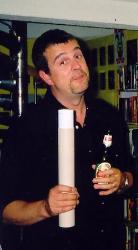 As I said earlier, it’s hard when publishers demand instant success. Each year it’s as though one or two new writers are chosen - it’s like that huge finger that points on the advert when you’ve won the lottery. I don’t think there’s a recipe that’s foolproof. I think the worst thing you can do is try and fill a niche - to try and write like a cross between two or three other writers in the hope of grabbing some of their readers. As with those writers you mentioned earlier whose success was built over time, the cream will usually rise to the top but equally, the shit will eventually sink. Actually does that analogy work? Does shit sink or float? I should probably attempt to find out, but I’d have a hard time explaining myself if anyone walked into the bathroom and caught me. As I said earlier, it’s hard when publishers demand instant success. Each year it’s as though one or two new writers are chosen - it’s like that huge finger that points on the advert when you’ve won the lottery. I don’t think there’s a recipe that’s foolproof. I think the worst thing you can do is try and fill a niche - to try and write like a cross between two or three other writers in the hope of grabbing some of their readers. As with those writers you mentioned earlier whose success was built over time, the cream will usually rise to the top but equally, the shit will eventually sink. Actually does that analogy work? Does shit sink or float? I should probably attempt to find out, but I’d have a hard time explaining myself if anyone walked into the bathroom and caught me.
|
|
Ali
|
Can you tell us about what you found good in your reading pile?
|
|
Mark
|
Bizarrely, I haven’t read much crime fiction of late. I’m thoroughly enjoying a book on London’s underground rivers at the moment! I AM saving a ton of good stuff up with me to take away on holiday though - latest books by Mo Hayder, Michael Marshall, James Lee Burke and of course The Narrows by Michael Connelly which I can’t wait to read…
|
|
Ali
|
Dennis Lehane’s Shutter Island was one of my best reads of 2003, but it did divide many of his long-standing fans. As a Lehane fan, what did you make of Shutter Island?
|
|
Mark
|
I think, whether you’re a fan of Lehane or not, this is always going to be a love or hate kind of book. That’s a good thing, I think, whichever way the reader jumps. Nothing wrong with an extreme reaction. I loved it personally. I thought it was breathtakingly clever and disturbing, and let’s face it, he had a pretty tough act to follow in writing a book to come after Mystic River. It made you uneasy all the way through; off-kilter and uncomfortable. Probably a book that some will find easier to admire than to like…but I really got a lot out of reading it.
|
|
Ali
|
Moving onto your stand-up work, can you tell us a little about what that entails in terms of time and preparation, writing material etc?
|
|
Mark
|
It SHOULD entail a great deal of time spent in honing existing material and constantly creating new stuff. Reacting to events of the day and crafting jokes that illuminate as well as entertain. That’s what it SHOULD do. When you’re trying to write a new novel each year and have to spend a few months of that year promoting those that you’ve already written, you often find yourself just churning out the old stuff. I still enjoy it enormously, but increasingly I’m cutting right back on the stand-up, only doing those clubs I know I’m going to enjoy and not travelling too far.
|
|
Ali
|
Do you have a book of jokes like Bob Monkhouse, or are you more of an intuitive comic?
|
|
Mark
|
As I’m not writing a lot of new material, I compere at most gigs I do these days and as that involves bouncing off whatever the audience gives me I’d have to say that I work intuitively when I’m doing that. If it’s going well I’m not doing any material at all. You just go out there and see who’s waiting for you. It’s a very different buzz from writing. It’s instant; the feedback, good or bad, is immediate.
|
|
Ali
|
British comedy is having a renaissance of sorts, especially on TV with people like Dave Spikey, Ricky Gervais, Peter Kay et al. Can you tell us why British comedy appears to be dominated by clearly mad/delusional and monstrous characters such as David Brent, Basil Fawlty, Blackadder, Captain Mainwaring, Alf Garnett, Victor Meldrew etc?
|
|
Mark
|
You’re right, of course, and there are others. Rigsby, Steptoe, Reggie Perrin. British comedy has always been like that I think. It’s glib but it’s true to an extent that we write about losers and misfits while US comedy tends to be about beautiful, successful people. I think the major reason is that comedy here tends to be written by one, or at the most two people. A pair of misfits, batting jokes back and forth in a bedroom somewhere. US comedy is about teams of writers who are being paid a fortune to come up with better and better gags. It’s amazing that The Office has been such a smash over there. It remains to be seen of course just how the US version turns out.

|
|
Ali
|
I heard you were recently on stage with Martin Johnson and Lawrence Dallaglio, so what’s this new fascination with British rugby?
|
|
Mark
|
I just got asked to MC a couple of events for the team and had a great time. I’m enormously impressed by sports stars and just after the World Cup win these guys were about as big as it gets. They were all nice guys too; not the preening, overpaid ponces that a lot of footballers are. They were also endlessly patient with my feeble jokes; the mileage I was able to milk out of the words ‘balls’ and ‘tackle’ and so forth.
|
|
Ali
|
So, best of luck with The Burning Girl and see you around town!
|
|
Mark
|
Cheers, Ali. I shall make sure that my shoes are fashionable and highly polished…
|